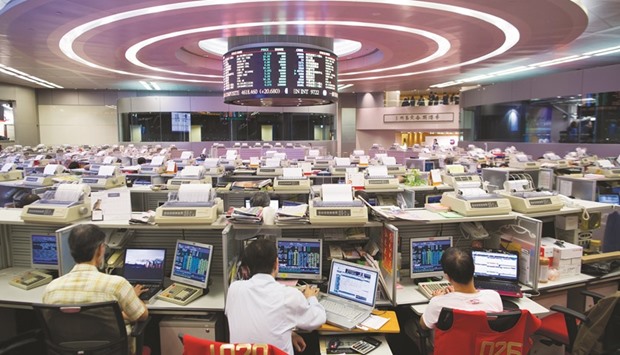Hong Kong real estate shares haven’t been this hot since the city’s last housing bubble burst almost two decades ago.
The industry’s benchmark equity gauge has surged 37% from this year’s low in January, climbing to the highest level versus Hong Kong’s Hang Seng Index in 19 years on July 29.
The last time property companies performed that well relative to the broader market was October 1997, just before the Asian financial crisis sparked a collapse in Hong Kong’s real estate market.
While few are predicting another plunge of that magnitude, the outperformance is ringing alarm bells for investors who worry that property shares have climbed too far, too fast.
Even as bulls point to stabilising home prices and a more favourable interest-rate outlook, Bocom International Holdings and Baring Asset Management say weak economic growth and surging apartment supplies will derail the advance.
“The rally in share prices is over,” said Alfred Lau, a Hong Kong-based analyst at Bocom. “People rushed in only seeing the positive things and overlooked the risk from the supply side.”
Real estate companies accounted for half of the Hang Seng Index’s 10 best performers since February 12, when Hong Kong shares ended a nine-month bear market. New World Development Co, Wharf Holdings and Cheung Kong Property Holdings all surged more than 40%, outpacing a 23% gain in the benchmark index.
Stock investors piled in as a 13% drop in home prices from record highs in September showed signs of bottoming out. Centaline Property Agency’s index of secondary property prices has climbed 3% since March 27.
The Hang Seng Properties Index was little changed at the close.
Easing concern about mortgage costs fuelled the rally after traders pushed back expectations for Federal Reserve interest- rate increases in the wake of Britain’s vote to leave the European Union. Borrowing costs in Hong Kong are linked to those of the US because of the city’s dollar peg.
Bulls should be worried about the city’s rising property supplies and weak economy, said William Fong, a Hong Kong-based portfolio manager at Baring Asset, which oversees about $35bn.
The total number of unsold units for projects in Hong Kong under construction or already completed jumped to 71,000 at the end of June, the highest in 12 years, according to Bloomberg Intelligence.
The city’s gross domestic product unexpectedly contracted in the first quarter, while retail sales in the city tumbled 8.9% in June, declining for a 16th straight month.
While real estate shares look extended relative to the broader market, valuations are still well below levels reached two decades ago.
The Hang Seng Properties Index is valued at 0.8 times net assets, down from as high as 2 times in 1997, according to data compiled by Bloomberg. The MSCI World Real Estate Index has a multiple of 1.7.
“From an international context, property developers in Hong Kong are really cheap,” said Arnout van Rijn, the Hong Kong-based Asia chief investment officer at Robeco, which oversaw about $291bn as of March. “The rally is more than justified and it can continue.”
Optimists may soon lose one of their key arguments as the US economy strengthens. Odds of a Fed rate hike by year-end rose to 47% from 37% after better-than-expected jobs data on Friday.
With Hong Kong borrowing costs sitting near record lows and home prices still almost 30% above their highs in 1997, any move toward historical levels could be painful for property bulls.
“After Brexit, many investors just played assets that could benefit from lower funding costs and Hong Kong property is indeed sensitive to US interest rates,” said Wenjie Lu, a Shanghai-based strategist at UBS Securities. “Almost all the trades will have to be reversed in case the Fed raises.”

Traders work at the Hong Kong Stock Exchange. The Hang Seng Properties Index is valued at 0.8 times net assets, down from as high as 2 times in 1997, according Bloomberg data.
